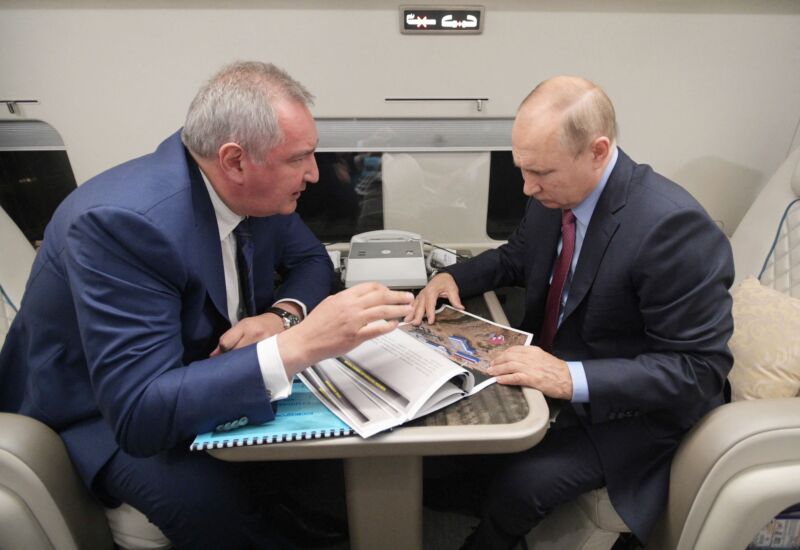Do more with less —
This cannot be a comfortable position for a certain Dmitry Olegovich Rogozin.
Eric Berger
–

Enlarge / Russian President Vladimir Putin speaks with head of Russian space agency Roscosmos Dmitry Rogozin during a flight to the Vostochny cosmodrome, on September 4, 2021.
ALEXEY DRUZHININ/Sputnik/AFP via Getty Images
Russia plans to slash funding for spaceflight activities during the coming three-year period, from 2022 to 2024. The cuts will come to about 16 percent annually, several Russian publications, including Finanz.ru, report. (These Russian-language articles were translated for Ars by Rob Mitchell.)
For 2022, the state budget for space activities will be set at 210 billion rubles ($2.9 billion), a cut of 40.3 billion rubles ($557 million) from the previous year. Similar cuts will follow in subsequent years. The most significant decreases will be in areas such as “manufacturing-technological activities” and “cosmodrome development.” Funding for “scientific research and development” was zeroed out entirely.
The publications say Russian President Vladimir Putin is unhappy with the performance of Russia’s space program. At a space industry meeting on September 29, they report, Putin criticized the industry’s failure to fulfill directives on long-term goals in the space sphere. In 2020, for example, Roscosmos failed to hit 30 of the 83 stated goals of the national space program.
Putin has reportedly told the Russian space corporation, Roscosmos, that it must increase the reliability of Russian rockets and “master” the next generation of launch vehicles. This directive has come in response to growing competition in the global space launch business, particularly from US-based SpaceX.
These budget cuts, however, will only further constrain the leader of Roscosmos, Dmitry Rogozin. He is already facing budgetary pressures from the loss of income from flying NASA astronauts to the International Space Station—a project valued at about $400 million or more annually—as well as United Launch Alliance no longer purchasing RD-180 rocket engines.
The cuts also raise questions about the future of Roscosmos, which has been restructured on multiple occasions during the last decade. Following the breakup of the Soviet Union in the early 1990s, Roscosmos acted in a manner similar to that of NASA. As a space agency, it had a number of contractors who provided services and built rockets, spacecraft, and satellites. Among the biggest of these were RKK Energia, The Khrunichev Center, RCC Progress, NPO Energomash, TsENKI, and TsNIIMash.
In 2013, Russia re-nationalized its space industry and converted the contracting companies into corporations owned and operated by the state. Three years later, the Russian national space agency was then dissolved and merged into the Roscosmos State Corporation, which became the parent company for the state-owned space companies.
Rogozin became the head of Roscosmos in 2018, and last year he further reorganized its subsidiaries into business blocks.
In recent years, Roscosmos has been beset by corruption in its efforts to build a large new spaceport in the eastern part of the country. In 2019, before he was jailed by Putin, opposition leader Alexei Navalny alleged widespread corruption across the Russian space enterprise and detailed how Rogozin appears to have enriched himself personally.
According to documents uncovered by Navalny, Rogozin used Roscosmos funding to purchase a Mercedes-Benz S560 for himself and a Range Rover for his wife. Combined, these vehicles are valued at about $300,000. The Roscosmos chief then acquired an 8,600-square-foot dacha north of Moscow worth about $3 million. And the documents appear to obscure even more gains, Navalny argued.
Rogozin has denied these allegations. And frankly, for a Western-based journalist who does not speak Russian or fully understand Russian politics, it can be difficult to disentangle truth from lie. But what does seem clear is that the Russian space program’s future is bleak. Whereas China is rising with a space station of its own and ambitious new exploration plans and the US space industry is flourishing amid a rise in commercial activity, Russia is seeking to maintain a status quo of space vehicles developed decades ago.
The country’s space employees are already paid extremely low wages. Now, there will be fewer resources to invest in the future—a future into which Putin has charged Rogozin with leading Russia’s space program. This cannot be a comfortable position for a certain Dmitry Olegovich Rogozin.

